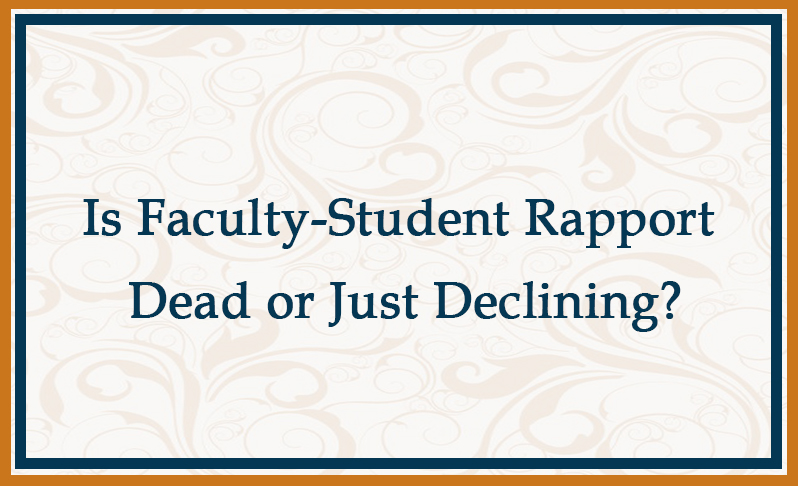For years Charlie and Hal have shared an office. The first one there in the morning at around 7:30 opens the door and puts on a pot of our special-blend coffee. The open door and the aroma of freshly brewed coffee serve as an invitation for anyone—staff, colleagues, administrators, or students—to drop in for a chat. Likewise, when any of us go to class, we try to get there early, usually just as a previous class is letting out. We always stay late, sometimes talking with students as we move down the hall and back to our office.
No one had to tell us what we later learned from the research. Open doors will open hearts and minds. One reason we entered the teaching profession was the great rapport we had with our instructors from kindergarten through graduate school. Somewhere former Alabama football coach bear Bryant remarked that people don’t tie to an English class the way they do to a football team. The Bear was right, partially—people tie to people.
What is Faculty-Student Rapport?
When we wrote Achieving Excellence in Teaching: A Self-help Guide (2014), we preceded our discussion of best pedagogical practices with a section on dispositions, key attitudes necessarily present in highly effective instructors. One of those dispositions is rapport, which we defined as “a harmonious relationship that increases motivation, performance, and provides personal fulfillment for all affected—the faculty, the students, and the learning community” (40). In our way of thinking, without rapport the instructor was going to have a much more difficult time developing student learners.
How Online vs Offline Communication Affects Faculty-Student Rapport
In the Sunday (10 May 2015) Review section of The New York Times, Mark Bauerlein, an English Professor at Emory University, has written a provocative piece about the decline of rapport. In “What’s the Point of a Professor” Bauerlein points out that surveys find that today’s students have a positive attitude toward their professors. Of course they do, as the cynic in us feels compelled to point out since 1960 the percentage of college students has almost tripled from 15% “A”s to today’s rate of 43%. Baulerlein also notes at “61% of students said that professors frequently treated them `like a colleague/peer,’ which would be a good thing if we didn’t feel that some of that rapport had been purchased by a good grade.
Baulerlein then bemoans the students’ lack of face time with their professors. Beyond the 2.5 classroom hours/week, “contact ranges from negligible to nonexistent. In their first year, 33 percent of students report that they never talk with professors outside of class, while 42% do so only sometimes. Seniors lower that disengagement rate only a bit, with 25% never talking to professors, and 40 percent sometimes.”
How to Measure Learning Fostered By Faculty-Student Rapport
Certainly Internet communication between faculty and students has risen the past twenty years, but virtual time is not face time. As far as we know, no one has figured out a way to measure how much student learning has occurred because of a personal rapport, and we doubt such an assessment will ever happen. Nonetheless, our personal experience has taught us that it’s the personal relationships established with fifth-grade teacher Miss Dexter and Romantics professor Huntley that got us to this point in our careers. Had Mrs. Clark not sent that note home or Dean Gillum called our father, would we have succeeded?
We think not. A few years ago we started a series for our university’s alumni magazine that proves our point. In “If It Weren’t for Professor X” (no, not the head of Marvel’s X-Men), alumni wrote testimonials about their personal and professional lives being directly affected by specific college instructors. The series, however, died, and thanks in part to Bauerlein’s editorial we now understand one more cause.
Do we think student learning will suffer because of this lack of rapport? Yes. Do we think that we’ll ever be able to prove it? Probably not. On the other hand, as we type this post, our office door is open, and the strong aroma of coffee still wafts through the jambs.
About the Author
 Dr. Russell Carpenter is director of the Noel Studio for Academic Creativity and Program Director of the Minor in Applied Creative Thinking at Eastern Kentucky University. He is also Assistant Professor of English. Dr. Carpenter has published on the topic of creative thinking, among other areas, including two texts by New Forums Press. In addition, he has taught courses in creative thinking in EKU’s Minor in Applied Creative Thinking, which was featured in the New York Times in February 2014. Meet Russell.
Dr. Russell Carpenter is director of the Noel Studio for Academic Creativity and Program Director of the Minor in Applied Creative Thinking at Eastern Kentucky University. He is also Assistant Professor of English. Dr. Carpenter has published on the topic of creative thinking, among other areas, including two texts by New Forums Press. In addition, he has taught courses in creative thinking in EKU’s Minor in Applied Creative Thinking, which was featured in the New York Times in February 2014. Meet Russell.



